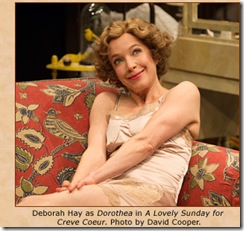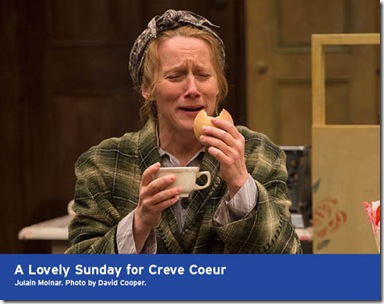A Lovely Sunday for Crève Coeur is a curious hybrid that suggests Williams is wrestling with his own demons.
Photo. David Cooper. Julain Molnar as Miss Gluck
In the Shaw Festival programme, professor/critic Annette J. Saddik writes that in the 1960’s , after his last complete full length play, Williams was exploring “anti-realistic styles, embracing contradictions (…) shifting between minimalism and excess, the tragic and the comic”. This comment certainly introduces us to A Lovely Sunday for Creve Coeur where the contradiction is already inscribed in the title of the play. However, I would certainly not define Williams’ earlier work as “realistic” by any means with its strong tendency towards expressionism (Streetcar) and even elements of symbolist drama (Menagerie) that he himself has explained in several of his introductions. Nevertheless the anti-realism is very clear in this work and if Creve Coeur is noted for its “tragicomic playfulness” by Saddik, the play as well as this staging, pinpoint the problems that arise with Williams’ attempts at comedy.
Dotty (played by a buoyant and adorable Deborah Hay who certainly has an impeccable sense of comic timing and intense fun) is a fragile creature who appears to be a caricature of Blanche Dubois or even a less timid Laura, living under the illusion of the impending “gentleman caller”. As the play evolves, we meet her brash, feet on the ground, roommate Bodey of German descent (a no nonsense Kate Henning who seems to yell too much until we realize that the character is supposed to be hard of hearing and her hearing aid is not working). Bodey is preparing delicious dishes for a nice Sunday picnic with her brother. She tries to convince her roommate that the brother would be the perfect mate for her (and provide Bodey with the nieces and nephews she is anxious to have) . Dotty stubbornly clings to a man of her dreams. He seems real but we are not sure. Eventually, we learn something that Dotty does not know and the second part of the hour is dominated by our waiting for the infatuated young woman’s world to implode when she learns the truth. 
This dramatic thread appears to evoke pathos much more than comic possibilities even though Dotty, the dreamy young lady spends most of that first part doing her exercises in a flimsy shirt, flitting about the tiny cramped apartment with her legs spread wide open, while listening to Bodey cooking up a storm in the kitchen and chattering like a magpie. Underlying Bodey’s apparently light hearted chatter is a terrible sense of desperation that has her almost forcing her brother on Dotty. There is a definite malaise in this relationship that becomes ever more uncomfortable as the staging turns the whole thing into a southern American version of a French farce. As a grotesque and grieving neighbour (Miss Gluck played by Julain Molnar) keeps popping up at the front door and Dotty’s nosy, snobby co-worker Helena (Kaylee Harwood) comes over in an aggressive attempt to nearly extort money for their new house, the play turns into a full Feydeau-style event with doors slamming, people appearing and then disappearing to avoid meeting other people. They run and hide, they bump into the furniture in this tiny apartment, intentionally full of clutter and tasteless colours – a real feat by designer Cameron Porteous who crammed it all onto that small space. This wild stage business appears to say to the audience, your are now watching a comedy! But is it really a comedy? Underlying it all is an unsuccessful attempt to create comedy out of something that is far from it.
Only during the second movement of the play, once Dotty is dressed and the discussion turns to her imagined boyfriend do we see that his image clashes with Helena’s dream to move into that new apartment with Dotty. Here, the substance of the show makes itself felt and we are much closer to the Tennessee Williams we know, as the exacerbated sensibility of the lead character Dotty, becomes the focus of the dialogue. At that point the play engages us because it captures a lot more stylistic and emotional harmony. It is clear that Williams is not a good author of comedy because his talent for creating fractured, near neurotic sensibilities is so strong that when he tries to lighten his characters, they become downright silly. There is no middle ground. That soon became painfully clear.
Nevertheless, director Blair Williams. In spite of the play, was able to maintain a sense of the Williams’ atmosphere that we recognize. His direction of actors was very sure and his cast was of the highest quality. Unfortunately, the play did not make his task that easy but then this is a work that we might never see again. As a sample of the writer who is, to my mind, the greatest American playwright of the 20th Century, this is an important chance to see one of his “playful mishaps” , if only to understand the way his theatre evolved through the years.
A Lovely Sunday for Creve Coeur continues as part of the lunchtime one-act programme at 11h30 in the Court House Theatre.
